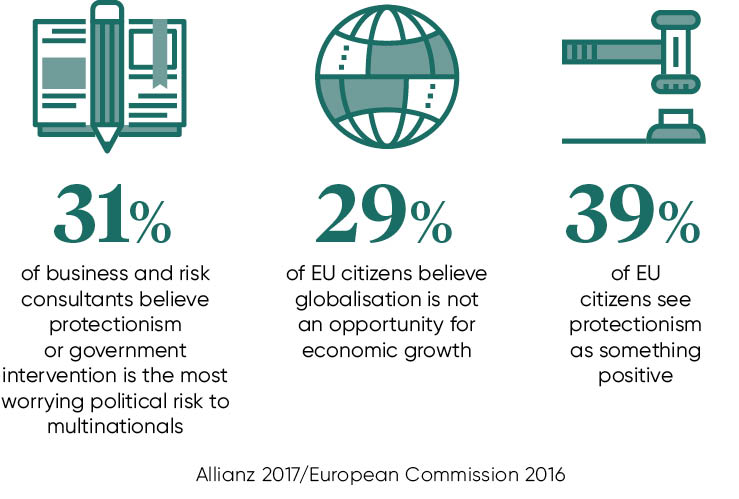The world has been transformed since China opened up in 1990. Never in human history have so many people been lifted out of poverty in such a short time – more than one billion by 2010 and hundreds of millions more since. Nor is it hard to know why. The high octane fuel powering the global economy to these new peaks was the transformation brought about by international supply chains.
But in any revolution there are losers as well as winners and now the world has to learn how to accommodate the backlash. The election in the United States of Donald Trump, the vote for Brexit in the UK and the surge in support for economic nationalism across Europe have given a voice to those who feel left behind. The representatives of the discontented now have their hands on the levers of power.
And in the protectionist stance of President Trump with his tearing up of the Trans-Pacific trade treaty, the threats against Mexico and China, the promise to bring jobs back to the United States, the belligerent proclamation of America first, comes the first serious challenge to the new globalised order.
People may think the clock cannot be turned back. But that is not the lesson of history. Globalisation was the dominant achievement of the late-Victorians, yet the great power rivalries it engendered led to its destruction in the conflict of the First World War.
However, there are also reasons for hope if only because the world is already so deeply entwined.
Complex supply chains
One of the more complex claims faced by the London insurance market last year concerned the loss of business suffered by a Canadian company let down by a South African supplier. When pressed, the South Africans claimed they had been themselves let down by a Japanese firm which in turn transferred the blame to a subcontractor in Thailand. We failed, the Thais explained, because of a flood. But no matter as they were fully insured with a policy in London.
Nothing illustrates better the reality of modern business in a globalised world. We are literally all in it together. Relationships can be between one country and another, but more often it is a complex network which entwines us all.
The Apple iPhone may have been designed in California, but it is assembled in China with parts sourced from across the world. Internet technology allows for architects in Argentina, accountants in India, software specialists in Silicon Valley and production designers in Denmark all to work as one on a project co-ordinated from a converted warehouse in London’s Shoreditch. Free movement of labour, goods, services and capital is not a by-product of the modern business landscape, it defines it.
The ability to put together, monitor and manage a global supply chain is one of the key differentiators of business success and for that reason, if no other, is also one of the major sources of risk, volatility and uncertainty. It is no exaggeration to say that getting it right, and keeping it right, is the key challenge facing modern business. Procurement is no longer some obscure back-office function, it is central to strategy.
Thus even the trade association whose members supply the National Health Service with its drugs has warned, via a letter to the Financial Times, that the smooth operation of its distribution and supply chain depends on Europe-wide regulation and trade-mark recognition. Once these disappear with Brexit, the supply chain will run much less smoothly, and increase the possibility of medicine shortages in the UK and a rise in the cost of medicines for the NHS.

Age of uncertainty
International supply chains also mean an end to the old certainties. It has been taken for granted almost since the first intellectual stirrings of economics as a science that cutting the value of your currency makes your exports cheaper so you can sell more. But not anymore as the last British devaluation has shown. In many exports, the import content is so high it pushes up the price of the assembled final product almost as much as the currency depreciation is supposed to cut it.
It also hints at a greater truth which is that in the modern sophisticated just-in-time world, price is often less important than quality, design, after-sales service, and speed and reliability of delivery. That is why, having found trusted suppliers, firms will not casually break the links. Political pressure may make life uncomfortable, but in a ferociously competitive world where there is over capacity in most areas, it is unlikely to overcome business reality.
Indeed what is different this time is the power of corporations. We live in an age when Apple is bigger than half the member states of the UN, where the elite who assemble every year in Davos are courted by politicians and resented by much of the rest of the world precisely because it is they who ultimately pull the majority of the world’s strings. They rarely boast about it, but they believe they can normally stare down and outlast even the most determined demagogue.
That said the world trading system is likely to be more tested in the next four years than in the previous 40. Questions will be asked of supply chains, contracts will be torn up and long-term business arrangements challenged. There will undoubtedly be periods of turbulence and greater volatility.
Some companies will certainly feel pressured to bring stuff back on shore. For them there will be much fanfare and friendly tweets. But the majority are more likely to see political uncertainty as just another risk to manage and diversify away. They need to play a long game. Cool heads are never more valuable than when they are in short supply.
Complex supply chains

